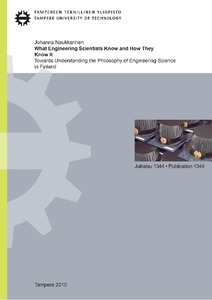What Engineering Scientists Know and How They Know It: Towards Understanding the Philosophy of Engineering Science in Finland
Naukkarinen, Johanna (2015)
Naukkarinen, Johanna
Tampere University of Technology
2015
Tieto- ja sähkötekniikan tiedekunta - Faculty of Computing and Electrical Engineering
This publication is copyrighted. You may download, display and print it for Your own personal use. Commercial use is prohibited.
Julkaisun pysyvä osoite on
https://urn.fi/URN:ISBN:978-952-15-3641-0
https://urn.fi/URN:ISBN:978-952-15-3641-0
Tiivistelmä
Knowledge, research and science are all concepts into which every member of the scientific community must have some kind of insight. Although nowadays there appears to be a general consensus that engineering science is a scientific enterprise in and of its own, this has not been the case for very long. As a scientific discipline, engineering science has been somewhat neglected from the standpoint of epistemology and philosophy.
This study aims at understanding the prevailing philosophy of engineering science in Finland. It strives to comprehend the essence and challenges of knowledge and knowledge-creation processes in the field. It is hoped that the resulting comprehension will improve the research community's possibilities 1) to reflect critically upon its procedures, 2) to discuss what should be studied and how, and 3) to determine on what bases the processes and results should be evaluated. It is also expected to assist in developing doctoral education and to result in better supervision by providing a framework and vocabulary for philosophical and methodological discussion.
The cognitive interest in this study is practical, and the orientation hermeneutic. The process follows the general lines of qualitative research and applies the method of qualitative content analysis. As an empirical inquiry, this study belongs to the realm of science and technology studies. The phenomenon was studied in the context of Finland in the guise of a single-case study, with Tampere University of Technology as the case.
The final results support the view that engineering science certainly is a scientific discipline in and of its own, characterised by its own technical matrix. Most engineering science research can be classified as design science. Scientific inquiry in engineering science often requires building conceptual—but also material—constructs, as well as developing new methods for different purposes (analyses, design, implementation, evaluation). Consequently, the contributions recognised in research are of many types (artefacts, methods, declarative knowledge, proposals), but they are not always the kind of knowledge adhering to technical norms. Arriving at new theories or linking knowledge to existing theories seems to be even rarer than arriving at technical norms.
Engineering science is a discipline of considerable diversity. The objectives, methods, empirical processes and results pertaining to one type of inquiry can be very different from those found in other types of investigation. This study uncovered five distinct research profiles, but there may well be more to discover.
At the moment, the philosophy of engineering science has not raised significant interest, as it appears not to have many direct consequences; yet, there are challenges that engineering scientists face that may well be rooted in the lack of common understanding about the epistemic, ontological and methodological issues of the topic.
This study aims at understanding the prevailing philosophy of engineering science in Finland. It strives to comprehend the essence and challenges of knowledge and knowledge-creation processes in the field. It is hoped that the resulting comprehension will improve the research community's possibilities 1) to reflect critically upon its procedures, 2) to discuss what should be studied and how, and 3) to determine on what bases the processes and results should be evaluated. It is also expected to assist in developing doctoral education and to result in better supervision by providing a framework and vocabulary for philosophical and methodological discussion.
The cognitive interest in this study is practical, and the orientation hermeneutic. The process follows the general lines of qualitative research and applies the method of qualitative content analysis. As an empirical inquiry, this study belongs to the realm of science and technology studies. The phenomenon was studied in the context of Finland in the guise of a single-case study, with Tampere University of Technology as the case.
The final results support the view that engineering science certainly is a scientific discipline in and of its own, characterised by its own technical matrix. Most engineering science research can be classified as design science. Scientific inquiry in engineering science often requires building conceptual—but also material—constructs, as well as developing new methods for different purposes (analyses, design, implementation, evaluation). Consequently, the contributions recognised in research are of many types (artefacts, methods, declarative knowledge, proposals), but they are not always the kind of knowledge adhering to technical norms. Arriving at new theories or linking knowledge to existing theories seems to be even rarer than arriving at technical norms.
Engineering science is a discipline of considerable diversity. The objectives, methods, empirical processes and results pertaining to one type of inquiry can be very different from those found in other types of investigation. This study uncovered five distinct research profiles, but there may well be more to discover.
At the moment, the philosophy of engineering science has not raised significant interest, as it appears not to have many direct consequences; yet, there are challenges that engineering scientists face that may well be rooted in the lack of common understanding about the epistemic, ontological and methodological issues of the topic.
Kokoelmat
- Väitöskirjat [4772]
